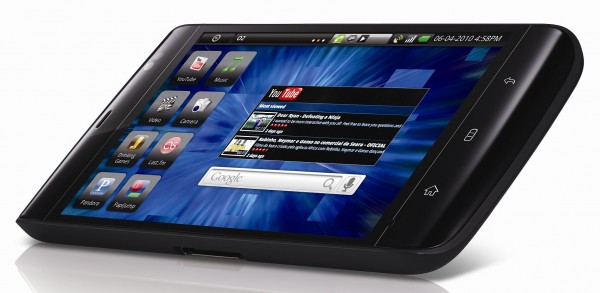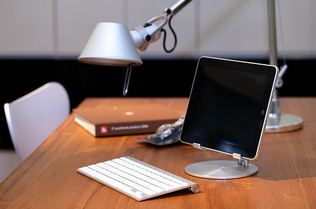I first wrote about AirStrip Technologies back in December 2009. At the time all the AirStip applications were availble for the iOS. That’s all changed as the company recently announced that AirStrip OB is now available from the Android Market.
(more…)
Category: Mobile Computing
-
AirStrip OB now available for the Android OS
-
What’s the best mobile operating sytem for pharmacy?
Mobile computing platforms have become somthing of a hot topic lately, especially in healthcare. What used to be something used almost exclusively by business people and gadget geeks is now mainstream among the average consumer. And to that end, mobile technology is starting to creep into the healthcare industry in large part due to the ever growing list of mobile devices, i.e. smartphones and tablets. Of course the iPad has been at the center of the discussion because it has been embraced by healthcare practitioners and has forced its way into many healthcare IT departments for better or worse. Not a day goes by now when I don’t see several physicians throughout the hospital carrying an iPad. Before the iPad it was the iPhone. See a trend here? I do.
(more…) -
Will the new crop of slate tablets be good for healthcare?
 I recently read an article in Laptop Magazine about the most anticipated tablets scheduled to hit the market over the next several months. Some things caught my attention.
I recently read an article in Laptop Magazine about the most anticipated tablets scheduled to hit the market over the next several months. Some things caught my attention.First, all the tablets listed were slate models and offered a variety of screen sizes. The smallest screen listed was 7 inches, while the largest was listed at 12 inches. Screen size is important to me so I was glad to see that the idea of larger devices wasn’t completely dead. The second thing was the variety of operating systems offered. Windows 7 and Android were prominent, but a couple of the tablet descriptions didn’t include an operating system. Based on the screen shots and a little web surging it appears that some of the devices may use proprietary operating systems. We’ll have to wait and see. And finally, almost all the tablets listed were clearly aimed at the consumer. In fact the only “enterprise†tablet that made the list was the Cisco Cius. The Cius is an interesting device as it will use the Android OS, a smaller 7 inch screen, 802.11n, 3G and 4G, and Bluetooth. I’m sure the company is hoping to leverage its VoIP and data systems against the needs of business users. In my opinion the Cius would provide significant functionality and potential for increased productivity to those businesses that already employ Cisco phone or data services. It makes sense to integrate tablets into a system that already uses the same infrastructure.
The two tablets that were conspicuously absent from the list were the BlackBerry PlayBook and the HP Slate which are both being marketed as enterprise devices. I love the idea of the PlayBook because it offers real-time video conferencing like the Cius and the ability to pair it with a BlackBerry smartphone to access online content. The potential to tether a smartphone to a tablet is quite appealing to me.
(more…) -
Micromedex drug information application for the iPhone
I received an email recently announcing the availability of a free Micromedex Drug Information application for the iPhone.
(more…) -
RxCalc 1.2 ready for download – want a free copy?
 RxCalc 1.2 has been approved by the powers to be at Apple and is now available for download in the iTunes store. For those of you that don’t know about RxCalc, it is a pharmacokinetics calculator made by Apple Core Labs specifically designed to handle aminoglycoside and vancomycin kinetics, i.e. new starts and adjustments. I’ve been intimately involved with the development of RxCalc, and you can read more about what drove the idea and the development of it here if you’re interested.
RxCalc 1.2 has been approved by the powers to be at Apple and is now available for download in the iTunes store. For those of you that don’t know about RxCalc, it is a pharmacokinetics calculator made by Apple Core Labs specifically designed to handle aminoglycoside and vancomycin kinetics, i.e. new starts and adjustments. I’ve been intimately involved with the development of RxCalc, and you can read more about what drove the idea and the development of it here if you’re interested.
(more…) -
The Skyscape iPad giveaway
I thought you might like to know that Skyscape is giving away 10 iPads as part of a promotion celebrating October 10, 2010, you know 10/10/10. All you have to do is spend $75 or more by 10/27/2010 and you’re automatically entered into the drawing.
Here’s the email I received:
Skyscape makes medical reference material designed for healthcare professionals. Most references are available for all the popular mobile platforms like the iOS, Android OS and the BlackBerry. You can take a peek at their list of drug information resources here. I don’t really use Skyscape references, but some of the items that jumped out at me included AHFS Drug Information, The Johns Hopkins POC-IT ABX Guide and iFacts: Drug Interaction Facts. Skyscape offers quite a selection.
-
Dell Streak to be integrated into healthcare solutions, Yippee!
 Dell announced today that it is going to integrate its Android-based mobile device, the Streak, into its healthcare solutions. The idea of a company the size of Dell working on something like this is truly exciting as it brings credibility to the Android platform in healthcare. In addition, you know the project is going to receive serious consideration and resources as Dell wouldn’t be willing to dump millions of dollars into something like this if they didn’t believe it would succeed. They clearly believe in the future of the Android OS. I would love to be involved in a project like this as it brings together so many fascinating technologies. In fact, I think I’ll dust off my resume and send a copy over to Dell. They’re bound to need a pharmacist on staff for something like this. Right?
Dell announced today that it is going to integrate its Android-based mobile device, the Streak, into its healthcare solutions. The idea of a company the size of Dell working on something like this is truly exciting as it brings credibility to the Android platform in healthcare. In addition, you know the project is going to receive serious consideration and resources as Dell wouldn’t be willing to dump millions of dollars into something like this if they didn’t believe it would succeed. They clearly believe in the future of the Android OS. I would love to be involved in a project like this as it brings together so many fascinating technologies. In fact, I think I’ll dust off my resume and send a copy over to Dell. They’re bound to need a pharmacist on staff for something like this. Right?
(more…) -
Don’t miniaturize your application, redesign it instead
Anyone that’s read this blog knows that I am a fan of mobile devices and touchscreen technology; from the smartphone to tablet PCs and the iPad. My love affair with mobile technology actually began with the HP 200LX palmtop computer when I was in Pharmacy School. I couldn’t believe that something so small could have so much power; funny now, but a marvel at the time. Now fast forward to early 2000 when I purchased a TRGpro, my first Palm OS device, and never looked back.
(more…) -
Do you think this is the future of mobile computing, or the past?
I came across this post at Mobile Health Computing, one of the many blogs of Dr. Joseph Kim.

Is this the future of mobile computing?
Here’s a great photo of an Apple iPad on a stand with a keyboard on the desk. Is this the future of mobile computing? Will we all end up using thin slate tablet computers that are held up on stands? While we’re sitting on a desk, we may use the keyboard. When it’s time to go, we grab the slate and we run off. No keyboard needed since we’re probably going to be computing on-the-go.
 The image from Dr. Kim’s post reminded me a similar setup I’ve seen in a pharmacy before. The image to the right is a J3400 tablet PCÂ attached to the Motion FlexDock. The FlexDock offers support for an external monitor, RJ45 nectwork connectivity and multiple USB ports for keyboard, mouse and printer. In addition the FlexDock includes a charging bay with room for an additional battery.
The image from Dr. Kim’s post reminded me a similar setup I’ve seen in a pharmacy before. The image to the right is a J3400 tablet PCÂ attached to the Motion FlexDock. The FlexDock offers support for an external monitor, RJ45 nectwork connectivity and multiple USB ports for keyboard, mouse and printer. In addition the FlexDock includes a charging bay with room for an additional battery.Would it surprise you to learn that the setup to the right was introduced more than a year ago (early 2009), and that the J3400 is an “older” model tablet PC that was recently replaced by the J3500? I find that interesting.
Either setup would be great. -
Toughbooks aren’t just cool, they save money too
I’ve mentioned Panasonic Toughbooks on this website before. I’m a real fan of the Toughbook C1 tablet PC with its multi-touch digitizer, 10 hour battery life, spill-resistant keyboard and tough magnesium alloy exterior. It’s definitely on my short list of most desired devices.
It turns out that Toughbooks are more than just cool technology, they may actually save healthcare a little money when used the right way. NHS Kirkless, a primary care trust in the UK estimates that they are saving more than $900,000 per year by deploying 600 Toughbooks to their care providers in the field.
(more…)
